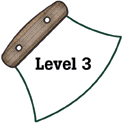
Alaska Science
Key Element B2
A student who meets the content standard should design and conduct scientific investigations using appropriate instruments.
 |
Alaska Science A student who meets the content standard should design and conduct scientific investigations using appropriate instruments. |
|
Performance Standard Level 3, Ages 11–14
|
|
|
|
Sample Assessment Ideas
|
Standards Cross-References
|
||
|
National Science Education Standards Identify questions that can be answered through scientific investigations. Students should develop the ability to refine and refocus broad and ill-defined questions. An important aspect of this ability consists of students’ ability to clarify questions and inquiries and direct them toward objects and phenomena that can be described, explained, or predicted by scientific investigations. Students should develop the ability to identify their questions with scientific ideas, concepts, and quantitative relationships that guide investigation. (Page 145) Design and conduct a scientific investigation. Students should develop general abilities, such as systematic observation, making accurate measurements, and identifying and controlling variables. They should also develop the ability to clarify their ideas that are influencing and guiding the inquiry, and to understand how those ideas compare with current scientific knowledge. Students can learn to formulate questions, design investigations, execute investigations, interpret data, use evidence to generate explanations, propose alternative explanations, and critique explanations and procedures. (Page 145) Different kinds of questions suggest different kinds of scientific investigations. Some investigations involve observing and describing objects, organisms, or events; some involve collecting specimens; some involve experiments; some involve seeking more information; some involve discovery of new objects and phenomena; and some involve making models. (Page 148) Current scientific knowledge and understanding guide scientific investigations. Different scientific domains employ different methods, core theories, and standards advance scientific knowledge and understanding. (Page 148) Scientific investigations sometimes result in new ideas and phenomena for study, generate new methods or procedures for an investigation, or develop new technologies to improve the collection of data. All of these results can lead to new investigations. (Page 148) |
Benchmarks Scientists differ greatly in what phenomena they study and how they go about their work. Although there is no fixed set of steps that all scientists follow, scientific investigations usually involve the collection of relevant evidence, the use of logical reasoning, and the application of imagination in devising hypotheses and explanations to make sense of the collected evidence. (Page 12) Be skeptical of arguments based on very small samples of data, biased samples, or samples for which there was no control sample. (Page 299) |
|
Table of Contents | Return to Alaska Native Knowledge Network